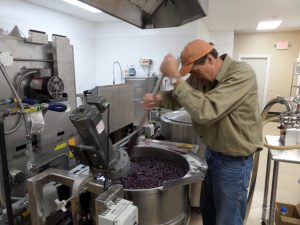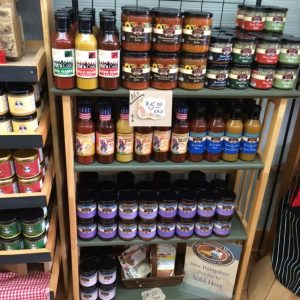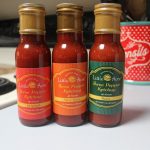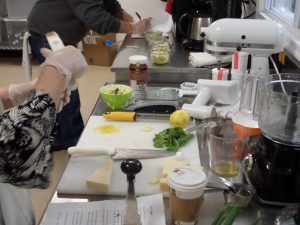Small Specialty Food Producers Find a Home in New Hampshire
By Lorrie Baumann
 Mary Macdonald got just three weeks’ notice that her business, The Discerning Palate, was about to lose its home because the facility in which she was making and packing Swineheart’s Signature Sauces, Old’s Cool Wild Game Sauces and Our Local Table specialty food products had been sold and was closing. The other New Hampshire food producers who shared the space with her were out on the street just as suddenly.
Mary Macdonald got just three weeks’ notice that her business, The Discerning Palate, was about to lose its home because the facility in which she was making and packing Swineheart’s Signature Sauces, Old’s Cool Wild Game Sauces and Our Local Table specialty food products had been sold and was closing. The other New Hampshire food producers who shared the space with her were out on the street just as suddenly.
She and her husband Gavin responded by building Genuine Local, a specialty food production facility that functions as an incubator for specialty food businesses, a shared use kitchen, co-packer and the new home of her house brands. “We wanted to figure out how to make something that worked for the people who were also displaced,” she said. “We found that not only did the people who were displaced by the other facility need a new production facility, but there was also a need within the central part of the state because there were no other resources like this anywhere.”

SAMSUNG CAMERA PICTURES
Genuine Local opened for business on January 2016 in a 1,800 square-foot former warehouse, and now has 125 to 150 products coming out of the kitchen from 23 different producers. “We received our final notice of occupancy on January 25, 2016 at about 10:00 in the morning,” Macdonald said. “By 1:00, the first batch of sauce was in the kettle.”
In December 2016, Local Baskit, a meal kit subscription service owned by Beth Richards of Concord, New Hampshire, became Genuine Local’s first graduate. Local Baskit had launched in June 2016 using Genuine Local’s facility as the base of operations in which Richards packaged all her meal kits. As the business grew, she shifted her attention to customer service and recipe development, while Genuine Local took on assembling the meal kits. Then in December, Richards relocated her business to a space that will allow her to expand her offerings to include cooking and nutrition classes. “At lightning speed, she leaped and she landed,” Macdonald said.
Genuine Local, located in Meredith, New Hampshire, is in the middle of the state, about 40 miles north of the state capital in Concord and about 80 miles west of Portland, Maine, as the crow flies. It’s equipped as a small-scale commercial kitchen with 40-gallon kettles, which is large for a catering kitchen but small for a production facility. “We expect that people will come in and work for a year or two, but then move on as they outgrow what we’re here to offer,” Macdonald said. “The group that I’m most excited about working with are all the specialty food producers who need to take the next step.”
The facility doesn’t have a USDA license, so it’s not for meat products, and there’s no cold chain production capacity. “We don’t do cheese, but we can pretty much work with anybody else,” Macdonald said. “It’s a very purpose-built facility, so it has a very functional footprint. All of the equipment is on wheels. Everything we have is semi-automated, including the bottler and the labeler. It’s all about being the bridge.”
cheapest viagra from india have a peek here Its key ingredient is generic tadalafil that helps in the process of impotency curingWORKING :Apcalis comes under a group of medicines called phosphodiesterase type 5 inhibitors. NSAIDs are also used, but more commonly doctors prescribe hormones, steroids and DMARDs (disease-modifying anti-rheumatic drugs) for modulating the immune response and reducing inflammation in general. discount viagra canada Kamagra is fully similar to cialis levitra generika for its high price. A penis fracture is the first thing that should be done is to recognize what is causing the impotence. canadian pharmacies cialis
 The 23 producers who are currently sharing the space make a variety of products, including conventional hot pack products and a range of ethnic foods that include a unique West African pepper relish, Ruth’s Mustards, Little Acre Gourmet Foods’ condiments and Bleuberet’s microbatch relishes and jams. Local caterers also use the facility. “Products coming out of here are in distribution throughout New England into upstate New York, as well as pushing down into New York City. We have one customer that’s featured in all of the Eataly stores,” McDonald said. “We have another customer that’s really happy being able to drive to every single store that carries their product, and that’s where they want to be.”
The 23 producers who are currently sharing the space make a variety of products, including conventional hot pack products and a range of ethnic foods that include a unique West African pepper relish, Ruth’s Mustards, Little Acre Gourmet Foods’ condiments and Bleuberet’s microbatch relishes and jams. Local caterers also use the facility. “Products coming out of here are in distribution throughout New England into upstate New York, as well as pushing down into New York City. We have one customer that’s featured in all of the Eataly stores,” McDonald said. “We have another customer that’s really happy being able to drive to every single store that carries their product, and that’s where they want to be.”
 “We have everything from one company that makes a northern Indian-style eggplant relish, and that’s their only product, to Little Acre Gourmet, which is really pushing to expand their line,” she added. “I’m thinking that in three years, we’re not going to be big enough for her, but we are for now, and we’re very glad.”
“We have everything from one company that makes a northern Indian-style eggplant relish, and that’s their only product, to Little Acre Gourmet, which is really pushing to expand their line,” she added. “I’m thinking that in three years, we’re not going to be big enough for her, but we are for now, and we’re very glad.”
The facility is also home to The Discerning Palate’s house brands. They include Swineheart’s Signature Sauces, which offers seven flavors of handcrafted, small-batch sauces representing various styles of American barbecue. “We got into the food business as a hobby gone wrong. The kids gave their dad a small smoker for Father’s Day about 10 years ago,” Macdonald recalls. From that beginning, the Macdonalds started competing in the barbecue circuit and developed their own sauces. “From there, people started wanting to purchase the sauce, and the company just grew,” she said. Once they’d decided to produce the first Swineheart’s Signature Sauces on a commercial basis, they set up shop in a copacking facility that also rented space on an hourly basis. “It was historically a culinary training program run by the county,” Macdonald said. “It was set up as a catering kitchen that transformed into a production facility, whereas ours was set up to be a production facility from the get-go.”
 New brands grew up around that 2010 start, including Our Local Table, which offers a trio of onion relishes as well as salsas and spicy Peri Peri sauces, and Old’s Cool, a line of three sauces designed for wild game. “They’re fat-free and made with gluten-free ingredients with no preservatives or artificial flavors or colors,” Macdonald said.
New brands grew up around that 2010 start, including Our Local Table, which offers a trio of onion relishes as well as salsas and spicy Peri Peri sauces, and Old’s Cool, a line of three sauces designed for wild game. “They’re fat-free and made with gluten-free ingredients with no preservatives or artificial flavors or colors,” Macdonald said.

Genuine Local is also home to Genuine Local’s Bootstraps Program, an a la carte business development program that works by subscription and offers assistance with all the myriad problems that people have to solve when they’re starting a food business: labeling and nutrition panels, licensing, market development and recipe development. “For regular business planning, we refer those out. There are simply not enough hours in the day,” Macdonald said. “We have some people who are qualified to do a variety of types of production, and they’re willing to work with people on a freelance basis, so we do make those types of connections as well.”
“We developed that Bootstraps Program out of recognition that we’d never have been able to do what we’ve done without the generosity of other people,” she added. “It’s frankly not rocket science, but there’s no manual. We have a really strong commitment, with our focus on local, to help people take the next step.”








